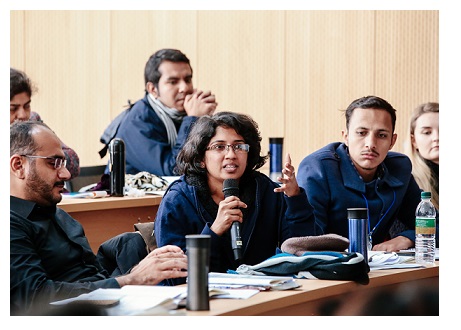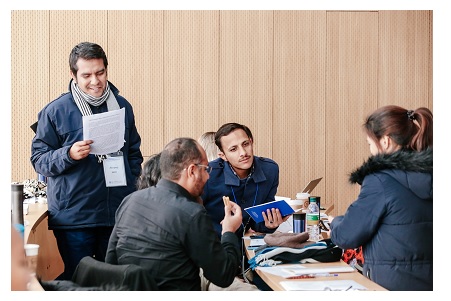Reviews 2018

Introduction

The fifth International Course on Human Rights and Asia organized and hosted by Seoul National University Human Rights Center served as an invaluable platform for participants to think about the universality of human rights in particular contexts of Asia and to gain a deepened understanding about human rights issues in this region
This year, the course brought 34 participants from 21 countries together: Afghanistan, Kenya, Bangladesh, Cambodia, China, India, Indonesia, South Korea, Myanmar, the Philippines, Russia, Nepal, Pakistan, Turkey, Sri Lanka, Thailand, Brazil, the United Kingdom, Belgium, Vietnam and Finland. The participants were of diverse professional backgrounds, consisting of activists, academics, international organization workers, researchers, and assistant judge. Participants were involved in a comprehensive and multidimensional learning program that includes not only lectures, but also presentations, discussions, field trip to DMZ and visit to human rights organizations in Korea. Our course ultimately aims at fostering an interdisciplinary study and multidimensional advocacy of human rights in Asia.
Approach and Contents of the Course
For this reason, the course syllabus covered a wide range of topics such as freedom of expression, climate change, sexual orientation and gender identity, social and economic rights and business and human rights, and the participants were given an opportunity to discuss them in the context of Asia.
Apart from the lectures, the participants were able to share their experience with extensive knowledge and expertise in relevant subjects through group discussion sessions. The participants divided into five groups gave presentations on the following issues in the context of Asia: business and human rights, media, refugees, same-sex marriage, health and environment.

Learning from South Korea’s Experience
– Visiting human rights organizations and DMZ

Also, participants had a chance to visit the Korean Demilitarized Zone (DMZ), learning about the reality of the division of Korea. At Dora Observatory, participants could see and feel the life in North Korea. Visiting the Imjingak Park and the Third Tunnnel was an opportunity to see the pain and tragedy of war,
“It was good to see with our own eyes the history and present of the conflict.” (Mariana Fernandes Santos de Brito, Brazil)
“Wow. I have really enjoyed visiting DMZ. It will be a memorable visit of lie. I will never forget this visit in my life.” (Ikramuddin Kamil, Afghanistan)
참가자들은 소그룹으로 나뉘어 각자의 관심사에 따라 어필, 차별금지법제정연대와 빈곤사회연대 중 한 곳을 방문했습니다. 단체 방문을 통해 참가자들은 한국의 활동가들과 직접 만나 한국 사회 내 여러 집단이 경험하는 인권 문제 및 현황에 대해 들었고, 각 단체 활동가들로부터 인권옹호 전략 및 단체 운영에 대한 통찰을 얻을 수 있었습니다. 참가자들이 자국에 돌아가서 하게 될 인권활동의 역량을 높이는 데 크게 기여할 것입니다.
“인권단체 방문은 인권과 아시아 프로그램 중 가장 좋았던 경험이었습니다. 다만, 다른 주제에도 관심이 있었기 때문에 한군데 이상의 단체에 가지 못한 것이 아쉽습니다” (Mariana Yante BARRÊTO PEREIRA, 브라질)
“인권단체는 우리에게 어떤 식으로 활동을 이어나가야 할지에 대한 아이디어를 주었습니다. 하지만 가장 중요한 것은 어떤 어려움이 우리에게 닥칠지라도 우리가 인권을 위한 투쟁을 계속할 수 있다는 영감을 주었다는 것입니다” (Rochelle Angela YU, 필리핀)
연구 및 옹호활동 계획

These assignments reflected the course’s intent for the participants to apply the lessons learnt to real life scenarios and their work. Participants were challenged not only to brainstorm on advocacy and research strategies, but also to take into considerations the various real-life restrictions and socio-political factors in the case studies. The multitude of feedback received from fellow participants was essential in enhancing ideas and improving analytical skills.
Feedback from the participants
According to the course evaluation survey, most of the participants responded they are very satisfied with the overall course programme.
“Since the first day of my activism, I always wonder about HRs; What is that? How did it come to existence? What is its true nature? In my country, it is so difficult to find some course that could teach me about HRs, due to the political background and context. However, participating the winder course helps me a lot in answering my own deepest questions. I love this course from the bottom of my heart.”
Le Minh Vu Hoang (Vietnam)
“A very interesting experience: had a chance to listen to different perspectives of the world’s prominent experts on Asia and human rights. Especially since a lot of academics is Switzerland focus mainly on Africa and Middle East, this course was crucial for gaining a global understanding of human rights”
Alexandra Egorova (Russia)
“It has been a very positive experience. I really appreciated how well-organised the whole course itself, along with the related factors like our accommodation was. Thank you for looking into all the details.”
Ranjita Dilaj (India)
I am appreciate that SNU HR center give chance to many people from many countries and backgrounds to learn and sharing their experiences here. “
Martha Bire (Indonesia)
SNU’s Winter Course Human Rights and Asia: a Time of Many Firsts
Aleydis Nissen (Belgium)
We have made it! With temperatures dipping as low as minus 17°C SNU’s ‘Human Rights and Asia’ Winter Course certainly deserves its name. For the fifth year, Dr. Joo-Young LEE and her team managed to create an esteemed training programme for delegates from all over Asia and the rest of the world. Also this year, the course aimed to reflect upon the universality of human rights in the particular contexts of contemporary Asia.
The training covered both general sessions on international human rights norms and mechanisms, and thematic sessions on contemporary issues and in Asia, such as freedom of expression and ‘business & human rights.’ The sessions were peppered with the personal experiences and presentations of the diverse cohort of participants. In these lively sessions, we did not shy away from addressing controversial topics such as ‘one-blood nationalism’ and the so-called ‘comfort women’.
The exceptional lineup of speakers provided us with a unique chance to get a peek inside the ‘internal cuisine’ of the United Nations (UN) as experienced by Asian representatives. Professor Dr Vitit Muntabhorn, for example, was the UN Independent Expert on Protection against Violence and Discrimination based on Sexual Orientation and Gender Identity until last year.
Two field visits supplemented the classes. First, our group split up to visit the National Commission on Human Rights of Korea and various NGOs in Seoul. My team and I visited Advocates for Public Interest Law, where we learned how this organisation tries to increase corporate accountability for human rights violations through parallel proceedings before UN treaty bodies and the Korean, Norwegian and Dutch National Contact Points. It was our first encounter with the vibrant and vocal South Korean civil society tradition, about which Maina Kiai, the former UN Special Rapporteur on the Rights to Freedom of Peaceful Assembly, had spoken so fondly. He said after his visit to South Korea in 2016: “The tradition of people coming together peacefully and taking to the streets or halls of power to speak their minds and effect change is inspiring and worthy of emulation elsewhere.” (A/HRC/32/36/Add.2 para 10)
The second visit to the Demilitarized Zone border provided another major moment of discovery. I used to know the zone that divides the Korean Peninsula only from history books and newspapers and had never even imagined having an opportunity to actually pay a visit. It was so special to descend into one of the infiltration tunnels that run beneath the border, dug by North Koreans and discovered by South Koreans back in 1978.
Dorasan train station was the next stop. Billboards in this station bring to life an enduring aspiration to bring the two Koreas together, boasting the tagline: ”Not the last station from the South, but the first station toward the North.” Seeing this, Jaeyoung PARK, a South Korean participant, quipped: ”It will be a long ride!”
With this course etched into my mind, I feel now much better equipped to conduct a South Korean case study for my PhD research, which focuses on human rights in the business context. I am Belgian, and until recently all of my training has been in Europe. This course gave me ample opportunity to discuss and reflect upon the practical, scientific and ethical challenges of conducting qualitative field research in the South Korean context. It is my ambition to return the favour by gathering knowledge that is relevant for policy makers and the advocacy network in South Korea.
Looking back, the ‘Human Rights and Asia’ course was a time of many firsts for me… and I haven’t even mentioned about my introduction to ginseng tea, hwangnam-ppang and the gems that can be found in Paju Book City. Let’s talk soon!

